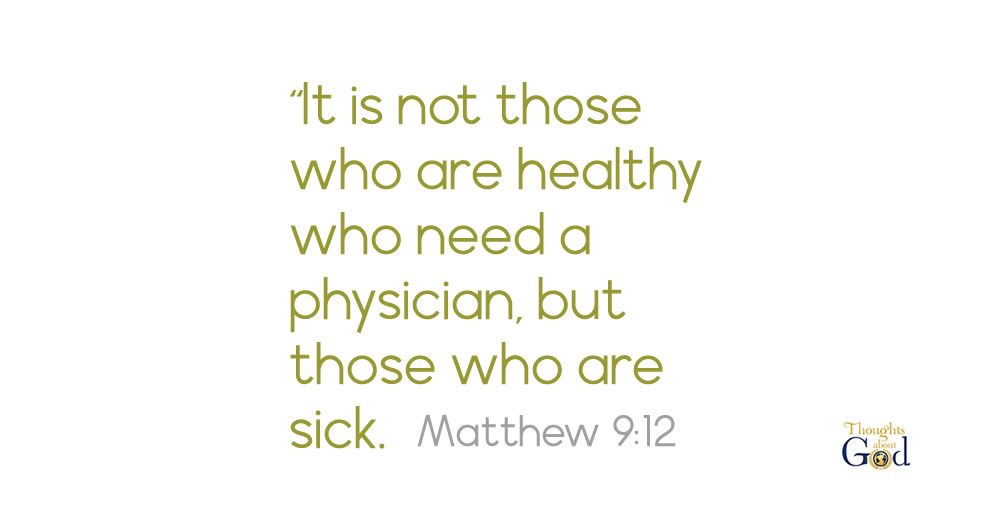Throughout His life, Jesus reached to those rejected by others. He loved the outcasts, those who were despised, scorned, and excluded. Yet His practice of dining with known evildoers offended the Pharisees, and they confronted Jesus’ disciples with this question: “Why is your Teacher eating with the tax-gatherers and sinners?” (Matthew 9:11).
When Jesus heard their question, He answered,
“It is not those who are healthy who need a physician, but those who are sick. But go and learn what this means, ‘I desire compassion, and not sacrifice,’ for I did not come to call the righteous, but sinners.” (Matthew 9:12-13).
Jesus told the religious Pharisees to go and learn what our heavenly Father meant when He said, “I desire compassion [mercy], and not sacrifice.” So many today are religious without being compassionate. Compassion in the Greek language means a “yearning in the bowels.” It is something that cannot be easily ignored.
You see, a religion without love is an abomination to God. The church needs to learn that God desires love and compassion, not merely an adherence to ritual and sacrifice.
It is right that we should be troubled by the sins of our nation. But we must remember, all nations sin. All cultures have seasons of moral decline and spiritual malaise. Yet these periods can become turning points if, in times of distress, leaders and intercessors cry to the Lord for mercy. Thus, Christlike prayer brings redemption out of disaster.
Mercy, Not Wrath
The church was created not to fulfill God’s wrath, but to complete His mercy. True prayer is born of love and comes in the midst of sin and need. It comes not to condemn, but to cover.
Jesus said His Father’s house would be a “house of prayer for all the nations” (Mark 11:17). Consider passionately this phrase: “prayer for.” Jesus taught His disciples to “pray for” those who would persecute or mistreat them (Matthew 5:44). When Job “prayed for” his friends (Job 42:10), God fully restored him. We are to “pray for the peace of Jerusalem” (Psalm 122:6), and “pray for” each other so that we may be healed (James 5:16). Paul wrote that God “desires all men to be saved” (1Timothy 2:4). Therefore, he urged “that entreaties and prayers…be made on behalf of all men, for kings and all who are in authority” (v. 1-2).
The nature of our calling is to pray for people in difficulty, in sin, in sickness, and in need of God.
Conformed to the Lamb of God
Consider this: the only being in all the universe worthy to “open the book” and release God’s wrath on sin is the very One in all the universe least likely to do so. His commitment to man’s redemption was a total sacrifice, an offering that abides eternally at God’s throne. Yes, He is the lion of the tribe of Judah, but He is also the Lamb slain for men’s sins. He is the only One to whom authority is given to open the book of divine wrath
(see Revelations 5).
Because Christ paid the highest price for redemption, we can be confident that He will not release divine fury until He fully exhausts divine mercy. Even then, when His judgments finally come, they will continue to be guided by His motive of mercy, giving time for sinners to repent.
God’s Word tells us plainly: “As He is, so also are we in this world” (1 John 4:17). Our pattern is the Lamb. Our goal is not merely the exposure of sin, but also the unveiling of the sacrifice for sin. Our great commission is to bring healing and the message of God’s mercy to the nations. Until Christ breaks the seals that ultimately will lead to wrath, we must stand in intercession before God as ambassadors of the Lamb.
May the Lord give us a clear vision of this truth: intercession is the essence of Christ’s life. Not only is He now at the right hand of the Father interceding for us (Romans 8:34), but His coming to earth and dying for sins was one extended act of intercession. Jesus beheld the depravity of mankind’s sin. He examined it carefully in all of its offensiveness, perversity, and repulsiveness. Yes, He rebuked it when necessary, but the wonder of the Gospel is that, in spite of mankind’s sin, God so deeply loved the world that He sent His Son to die for us (John 3:16-17).
We are called to follow this same amazing pattern of mercy.
We are not minimizing sin when we maximize Christ’s mercy. There is a difference between whitewashing sin and blood washing it. The reality that compels God’s heart—that is an underlying principle of life—is “mercy triumphs over judgment” (James 2:13). To live a life of mercy corresponds perfectly with God’s heart. Mercy precisely fulfills the divine purpose: to transform man into the Redeemer’s image.
By Francis Frangipane
Used by Permission
from a chapter in Francis’ book, The Power of One Christlike Life.
Available at http://www.arrowbookstore.com/
FURTHER READING
Come Alongside – what it looks like to come alongside of people while Jesus draws them closer.
Your Life is the Only Bible Some People Read
Learn more about knowing Jesus at: https://thoughts-about-god.com/four-laws/
Follow Us On:
SUBSCRIBE BY EMAIL: FOLLOW THIS LINK

